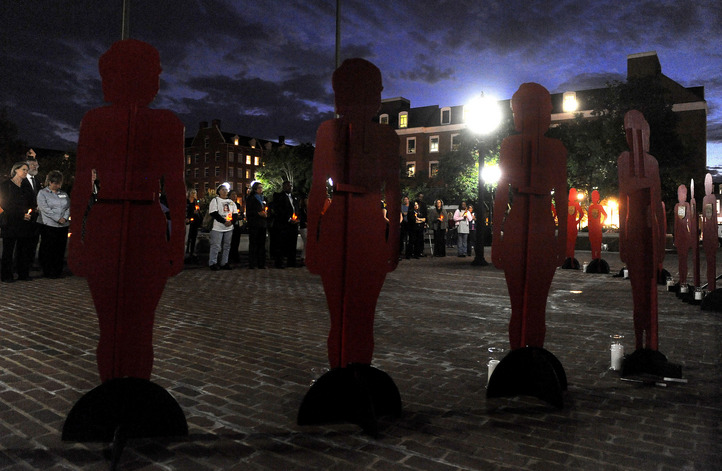The Terrorist Next Door
“If the numbers we see in domestic violence were applied to terrorism or gang violence, the entire country would be up in arms,and it would be the lead story on the news every night.”– Rep. Mark Green
Terrorism is defined as ” the systematic use of violent terror as a means of coercion”. We tend to define terrorists by incident- the September 11 attackers, the Boston bombers, the Oklahoma City bombers, the group behind the Kenyan mall attack, and on. The horrific September 11th, 2001 attacks gave rise to what we now call “the war on terror”, a war that may never end. September 11th also gave rise to a United States Government Department of Homeland Security. Between FY 2001 – FY2009, $850 billion was spent on the War on Terror, according to this source. http://useconomy.about.com/od/usfederalbudget/f/War_on_Terror_Facts.htm. After over 3,000 citizens were killed that day, our elected leaders understandably pledged to do everything in their power to keep our citizens safe.
And yet, consider the millions of victims who are terrorized each day, and terrorized where they live. Here’s a snapshot of the national landscape
- 1 in 4 women and 1 in 7 men will experience severe physical violence by an intimate partner in their lifetime. (CDC, 2017)
- 1 in 10 women in the United States will be raped by an intimate partner in her lifetime. (CDC, 2010)
- Approximately 16.9% of women and 8.0% of men will experience sexual violence other than rape by an intimate partner at some point in their lifetime. (CDC, 2010)
- Data on sexual violence against men may be underreported.
- Approximately 16.9% of women and 8.0% of men will experience sexual violence other than rape by an intimate partner at some point in their lifetime. (CDC, 2010)
- An estimated 9.7% of women and 2.3% of men have been stalked by an intimate partner during their lifetime. (CDC, 2017)
- Nearly half of all women and men in the United States will experience psychological aggression by an intimate partner in their lifetime. (CDC, 2017)
- Over half of female and male victims of rape, physical violence, and/or stalking by an intimate partner experienced some form of intimate partner violence for the first time before 25 years of age. (CDC, 201
Representative Green’s opening statement speaks volumes in how we see and deal with the perpetrators and victims of family violence. The people who commit these acts are criminals, though they are usually called “perpetrators”. But, there’s more to this. If terror is “the systematic use of violent terror as a means of coercion”, then let’s call these people what they are. Terrorists.
Lucy Berrington, in a Women’s E-News report in 2012, said this, “Domestic abuse is a form of terrorism that comes from within our society, resulting in mass casualties and extremely high costs. But for it’s victims, no big budget homeland security effort exists. “
She’s got that right. Others agree.
“Framing domestic abuse as ‘everyday terrorism’ helps us understand how fear works,” said Rachel Pain, the author of an English study called “Everyday Terrorism: How Fear Works in Domestic Abuse”.
“Not only do the victims of both forms of terrorism share the same painful consequences–the terrorists use the same tactics,” said Trese Todd, president of a Seattle nonprofit that addresses domestic violence.
In my years working in violence prevention, talking to survivors, advocates, and educators, I realize that they all are saying the same thing. The dynamics of intimate partner violence are eerily similar to the dynamics of terrorism , and they all know it and speak to it. The tactics used by abusers are addressed in our new documentary “Private Violence”, a film that finally brings answers to the age old question, “why doesn’t she leave”? She and her children are being terrorized, that’s why.
I’m choosing to re frame the conversation and remember that terrorists don’t always hijack planes and don’t always come equipped with bombs capable of mass destruction. Their weapons may differ, but they are terrorists, and they are in your town, they are on your street, and they may be just next door.
For more on what you can do to help prevent violence see http://www.futureswithoutviolence.org/section/get_involved/.
If you are in immediate danger, call 911.
If you are being hurt by your partner, it is NOT your fault. You deserve to be safe and healthy. For help and information anytime, contact:
National Domestic Violence Hotline
www.ndvh.org 1-800-799-SAFE (7233)
TTY 1-800-787-3224
National Sexual Assault Hotline
www.rainn.org
1-800-656-HOPE (4673)
National Teen Dating Abuse Helpline
www.loveisrespect.org
1-866-331-9474
TTY 1-866-331-8453


On 9/11, my first thought was “welcome to my world.”
I hope you will explore how many domestic terrorists escalate to perpetrators of shooting rampages. I started watching this dynamic after I learned that the DC Sniper’s intended tartet was his ex-wife.
Oh, agree Caroline. We interviewed his wife Mildred for PV, didn’t make it to final film, but we’ll have the clip online, when we get it all edited. Such a good point, and the first person to die in Sandy Hook was the killer’s mother, as well. And you read about men shooting up hair salons where their wives worked, etc.